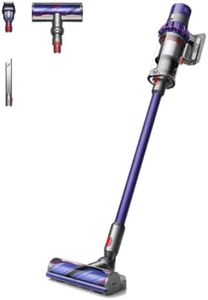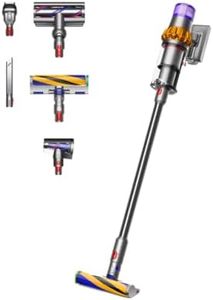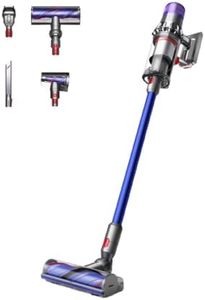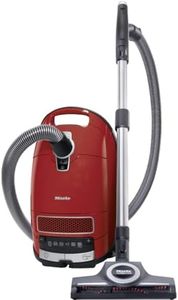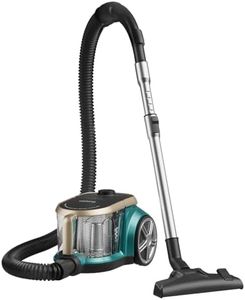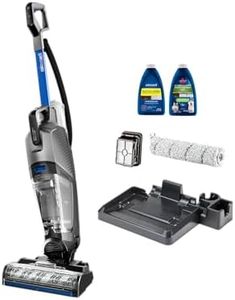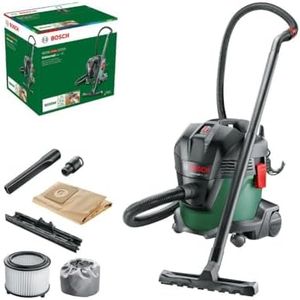We Use CookiesWe use cookies to enhance the security, performance,
functionality and for analytical and promotional activities. By continuing to browse this site you
are agreeing to our privacy policy
10 Best Camper Vacuum
From leading brands and best sellers available on the web.Buying Guide for the Best Camper Vacuum
Choosing the right vacuum cleaner for your camper is all about finding a balance between convenience, effectiveness, and the unique limitations of camper living. Campers generally have limited storage, smaller floor space, and sometimes restricted access to electricity, so it's important to focus on vacuums that are easy to store, lightweight, and efficient for quick cleanups. Clarifying how often you plan to clean, the types of debris you expect, and where you'll power the vacuum from will help you narrow in on what works best for your needs.Size and WeightSize and weight refer to how big and heavy the vacuum is. This is important for campers since storage space is tight and you may need to move the vacuum in and out often. Smaller, lighter vacuums are usually handheld or stick-style, making them very easy to tuck away and carry around, but they may have less suction power and dirt capacity. Larger vacuums might clean better but are harder to store and carry. Think about your storage space and physical comfort—if you have limited room and don't want heavy lifting, go for a compact, lightweight option.
Power SourceThe power source describes how the vacuum gets its energy—either via a cord plugged into an outlet, a battery, or sometimes even a car adapter. In campers, outlets can be limited and sometimes you need AC or DC adapters to use wall-powered vacuums. Battery-powered (cordless) vacuums add flexibility and portability, letting you clean anywhere, but their battery life is usually limited and they will need charging. If you have reliable access to power, a corded vacuum can run as long as you need. If you often camp off-grid or want to clean outside the camper, a cordless model is more suitable. Think about where and how often you'll use the vacuum and pick the power source that matches your lifestyle.
Suction PowerSuction power measures how efficiently the vacuum picks up dirt, dust, and debris. More suction means a cleaner camper, especially if you deal with sand, pet hair, or heavier debris. Suction is usually measured in air watts (AW), kilopascals (kPa), or simply described in product marketing as 'high/medium/low.' For occasional, light-duty cleaning, a moderate suction is fine. If you have pets, kids, or messy activities, look for higher suction ratings. Generally, lightweight vacuums may have less power, so match the suction level to your cleaning challenges.
Dustbin CapacityDustbin capacity shows how much dirt the vacuum holds before it needs emptying. Smaller dustbins fill up faster and need to be emptied more often, which could get annoying if you clean frequently or have a dirt-prone environment. On the other hand, larger bins take up more space, making the vacuum bulkier. If you only do quick, regular cleanups or have a small camper, a small dustbin should work. For bigger cleaning sessions or if you don’t want to empty it every time, aim for a medium-sized bin that balances storage and convenience.
Filtration SystemThe filtration system in a vacuum keeps fine dust, allergens, and dander out of the air. High-quality filters like HEPA are great for people with allergies or sensitive lungs. Simpler filters are easier to maintain but might let more dust escape when vacuuming or emptying the bin. If you or your guests have allergies, or you bring pets on trips, choose a vacuum with a good filter. If allergies aren't a concern, a basic filter saves on cost and maintenance time.
Attachments and VersatilityAttachments are extra tools that let you clean more than just the floor—like narrow crevices, upholstery, or even your car’s seats. Common attachments include crevice tools, brushes, and pet hair accessories. If your camper has various surfaces, lots of corners, or you travel with pets, more attachments stand to make cleaning easier. If you mostly use the vacuum on flat, open floors, you might not need extras. Consider your cleaning needs and habits when deciding how many attachments are worth having.

